 |
 |
 |
 |
 |
 |
 |
Council for Inclusive Capitalism - IV
Measuring a Company’s Obedience
Now, we will examine exactly how the CIC measures company obedience, which it euphemistically terms “company impact.”

The Council for Inclusive Capitalism at the Vatican, with Pope Francis
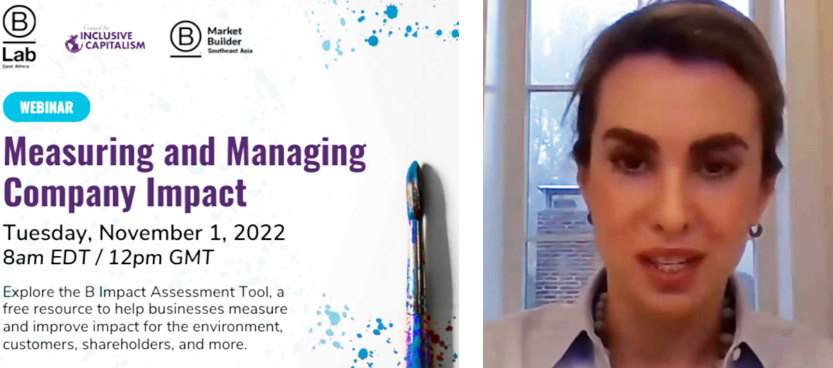
The CIC’s webinar “Measuring and Managing Company Impact”; at right, Council CEO Meredith Sumpter
B-Lab exists to transform for-profit companies into “benefit corporations,” or organizations that are committed to establishing “benefits” for the environment and society. Through this movement of economic agitation, B-Lab openly admits that they work to establish global stakeholder governance (aka Self-Managing Socialism) and adherence to Stakeholder Capitalism Metrics (the “benefits” dictated by the Secret Forces), towards which the CIC also actively works (explained in my last article here and here).
B-Lab explains its raison d’être further on its website:
“We began in 2006 with the idea that a different kind of economy was not only possible, but necessary – and that business could lead the way towards a new, stakeholder-driven model. B Lab became known for certifying B Corporations, which are companies that meet high standards of social and environmental performance, accountability and transparency.
"But we do much more than that. We’re building the B Corp movement to change our economic system – and to do so we must change the rules of the game. B Lab creates standards, policies, tools and programs that shift the behavior, culture and structural underpinnings of Capitalism...
"Together, we are shifting our global economy from a system that profits few to one that benefits all: advancing a new model that moves from concentrating wealth and power to ensuring equity, from extraction to generation, and from prioritizing individualism to embracing interdependence.”

B Lab: a group of agitators seeking to push
global stakeholder governance metrics, aka Socialism/Communism
The Council’s CEO Meredith Sumpter explains (at the 0:27 mark) that in the CIC’s video, they seek to “explore B-Lab’s ‘Impact Assessment’, a free online resource that enables businesses to measure and manage our social and environment performance. The B Impact Assessment tool provides an easy-to-use, insightful and standardized framework for evaluating and improving your business’ impact on stakeholders.”
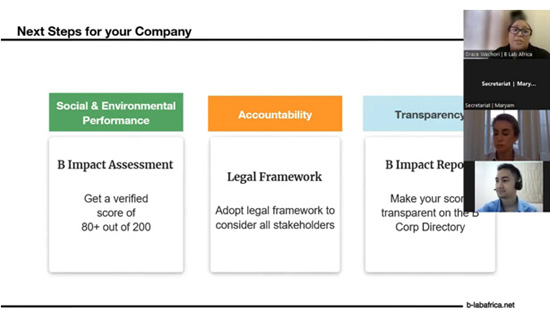
B Lab's Impact Assessment

In case it wasn’t sufficiently clear as to the goals of their organization, B-Lab published their governing framework, which they call “JEDI.” Playing on a Star Wars film reference to the fictional protectors of the universe and guardians of peace and justice, the JEDI framework stands for “Justice, Equity, Diversity and Inclusion.”
B-Lab explains in their 2021 JEDI Baseline Pillars of Focus that this JEDI framework particularly focuses on “racial equity and justice” and “shifting power and distributing leadership,” which are euphemisms for pushing class struggle and self-management, the latter of which is the ultimate goal of Communism.
B-Lab’s connection to the World Economic Forum
Not surprisingly, B Lab also has been praised by and has ties to the World Economic Forum:
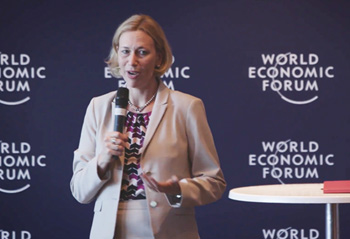
B Lab’s Eleanor Allen at the World Economic Forum; below, Juan Pablo Larenas

• The WEF has also praised B-Lab’s “Impact Assessment Tool.”
• The WEF’s sister organization, the Schwab Foundation for Social Entrepreneurship, formed the Berlin-based social business Gexsi that eventually submitted itself to the B Lab certification.
• B Lab Global’s lead executives, such as Eleanor Allen and Juan Pablo Larenas, have been featured and collaborated with the WEF (see also here), and are members and/or alumni of Schwab’s Foundation for Social Entrepeneurship (here) and the Schwab-founded group of Young Global Leaders (here).
• B Lab has actively participated in the WEF’s meetings in Davos. In the 2023 Davos meeting, B-Lab Switzerland partnered with Swiss and international companies to speed up the pace of businesses to reach Agenda 2030, repeating their action in Davos 2024.
Thus, it is clear that B-Lab acts as one of the indirect agents of the global elites like the WEF, agitating society and economies by pressuring corporations to submit themselves to their certification and gradually pushing Capitalism to look, walk and talk like Self-Management Socialism.
Framework of the B Impact Assessment Tool
Although the B Impact Assessment Tool is only available for business leaders, B-Lab has published some completed B Impact Assessments in their B Corp Directory. Readers can view a completed assessment here.
How does B Lab’s Impact Assessment measure impact? It divides its questions into five categories: governance, workers, community, the environment and customers.
Let us dive deeper by reading a sampling of some of the questions and their corresponding “correct” answers.
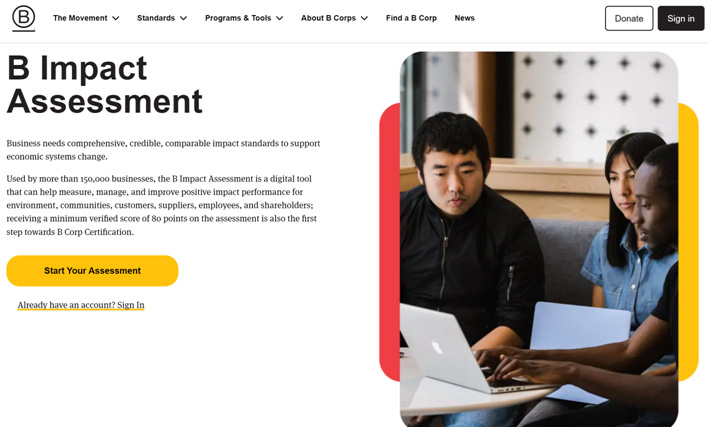
The B Impact Assessment on B Lab’s website helps to spread self-management socialism in businesses

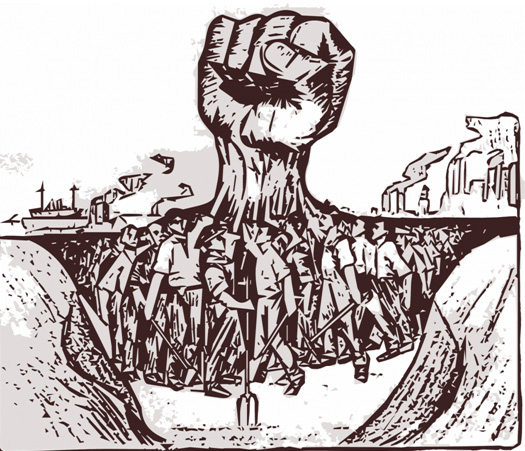
The Assessment rewards more points the higher the percentage. In other words: businesses are rewarded if they engage in employee ownership. This is a basic principle of Self-Management Socialism.
Under “Mission Lock” on p. 14: “Separate from a mission statement, what has your company done to legally ensure that its social or environmental performance is a part of its decision-making over time, regardless of company ownership?”
The correct answer is: “Amended corporate governing documents or adopted a legal entity or governance structure that requires consideration of all stakeholders in its decision-making (e.g. benefit corporation).”
In other words: businesses are rewarded for making their bylaws and governance structure such that it is legally forced to consider all stakeholders (everyone) when making decisions. This is Neo-Communism and radical egalitarianism in action.
Under “Worker Empowerment” on p. 31, B Lab asks: “How does your company engage and empower workers?” The correct answers: “We have adopted open book management or self-management principles within the workplace” and “Workers have opportunity to elect member(s) to the Board of Directors.”
In other words: the Board of Directors becomes subject to a democratic process, and Self-Management Socialism becomes the law of the workplace.
Page 34 reveals that B Lab rewards business that engage in collective bargaining, which is when the employer and workers unions enter into negotiations so as to decide the employee’s contract, terms, pay, benefits, etc. Again: this forces business to be at the beck and call of unions, which are socialist in nature.
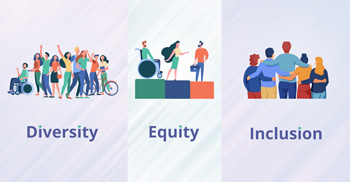
Under the excuse of diversity, businesses are forced to cater to the LGBT agenda in the workplace

Later on p. 36, B Lab asks businesses how they manage DEI. Among the rewardable answers are: “We track the diversity of our workforce”, “We have set specific, measurable diversity improvement goals that are reviewed by senior executives or our Board of Directors,” “we have conducted a pay equity analysis by gender, race/ethnicity, or other demographic factors and, if necessary, implemented equal compensation improvement plans or policies.”
With this, it becomes clear that diversity – not merit, talent, experience or tradition – becomes the driving factor in employee selection, with equal pay being enforced across this new diversity spectrum. The excuse of diversity is used to promote radical egalitarianism. Interestingly, B Lab avoids the issue of religion under DEI, perhaps to avoid accusations of breaching freedom of religion policies.

B Lab pushes the idea that humanity is destroying the planet, with the phrase “There is no Planet B”, below

Even more points are rewarded if their products are made using renewable energy, if the product “conserves/diverts resources (including energy, water, materials, etc.),” “conserves or preserves the well-being of land and/or animals,” “reduces or is made of less toxic/hazardous substances (e.g. brownfield remediation services, organic food, non-toxic cleaners),” and if the business “educates, measures, researches or provides information to solve environmental problems (e.g. environmental consulting or auditing).”
Key takeaways from the B Lab assessment
After considering all this data, what does this mean for businesses?
It means that businesses are no longer independent and free to govern, hire and operate as they see fit, according to the Catholic principles. Instead, they are now forced to become slaves to global business masters to install socialist principles in governance and operation, to foment class struggle by obsessing about diversity (with sodomy heavily emphasized in this category), and to become earth “justice warriors” by scrutinizing every action under the “green” lens.
In other words: the two Catholic principles of hierarchy (inequality) and organicity are scorned and penalized, while the socialist “equitable” collectivity and earth worship are prioritized over the Faith.
Since the CIC is being “blessed” by Pope Francis – following in the footsteps of Pope Benedict XVI – it is encouraging businesses to implement these anti-Catholic principles. It is clear that the Secret Forces are using the CIC and B-Lab as building blocks to create their Universal Republic constantly praised by the Conciliar Popes.
What surprises me is that, except for TIA, no one in the Catholic world is sounding any alarms about this. This is concerning, since the CIC seems to be the Revolution's vanguard tool in implementing worldwide Socialism, which is exactly what Our Lady warned us about and condemned (the errors of Russia, aka Communism/Socialism).
Have Catholics fallen asleep and lost their vigilance when it comes to spotting and condemning Communism & its variants? Do they not realize the implications of this global socialist initiative being blessed by the Papacy, and how it directly contradicts Catholic teaching?
One can only hope that more Catholics will wake up to this fraud and infiltration being imposed on us and which is taking us to ever-lower abysses of Communism

“The supreme objective of the Soviet State is the construction of a classless communist society in which a socialist communist self-management will be able to develop.” Constitución Editorial Progreso, 1980, p 5.– La Ley Fundamental de La Unión de las Repúblicas Socialistas Soviéticas, October 7, 1977, Moscow.

 Volume I |
 Volume II |
 Volume III |
 Volume IV |
 Volume V |
 Volume VI |
 Volume VII |
 Volume VIII |
 Volume IX |
 Volume X |
 Volume XI |
 Special Edition |


